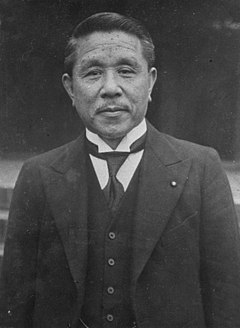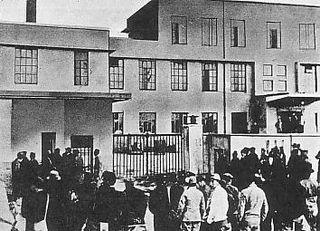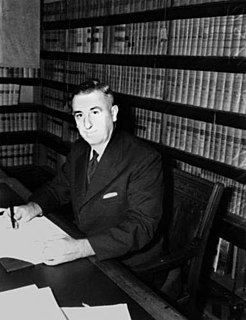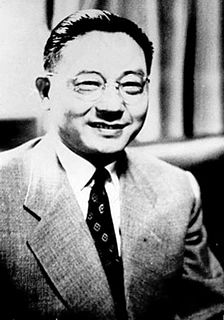
A war crime is an act that constitutes a serious violation of the laws of war that gives rise to individual criminal responsibility. Examples of war crimes include intentionally killing civilians or prisoners, torturing, destroying civilian property, taking hostages, performing a perfidy, raping, using child soldiers, pillaging, declaring that no quarter will be given, and seriously violating the principles of distinction and proportionality, such as strategic bombing of civilian populations.

Kōki Hirota was a Japanese diplomat and politician who served as the 32nd Prime Minister of Japan from 9 March 1936 to 2 February 1937. Originally his name was Jōtarō (丈太郎). He was executed for war crimes committed during World War II in the Tokyo Trials.

Sugamo Prison was located in the district of Ikebukuro, which is now part of the Toshima ward of Tokyo, Japan

Radhabinod Pal was an Indian jurist, who was a member of the United Nations' International Law Commission from 1952 to 1966. He was one of three Asian judges appointed to the International Military Tribunal for the Far East, the "Tokyo Trials" of Japanese war crimes committed during the Second World War. Among all the judges of the tribunal, he was the only one who submitted a judgment which insisted all defendants were not guilty. The Yasukuni Shrine and the Kyoto Ryozen Gokoku Shrine have monuments specially dedicated to Judge Pal.

War crimes in Manchukuo were committed during the rule of the Empire of Japan in northeast China, either directly, or through its puppet state of Manchukuo, from 1931 to 1945. Various war crimes have been alleged, but have received comparatively little historical attention.

Sir William Flood Webb KBE was a judge of the Supreme Court of Queensland and the High Court of Australia. He was President of the International Military Tribunal for the Far East after the end of World War II.

Mei Ju-ao was a Chinese jurist, legislator and author.
There are differences from one country to another regarding the definition of Japanese war crimes. War crimes have been broadly defined as violations of the laws or customs of war, which include crimes against either enemy combatants or enemy non-combatants. War crimes also included deliberate attacks on citizens and property of neutral states as they fall under the category of non-combatants, as at the attack on Pearl Harbor. Military personnel from the Empire of Japan have been accused and/or convicted of committing many such acts during the period of Japanese imperialism from the late 19th to mid-20th centuries. They have been accused of conducting a series of human rights abuses against civilians and prisoners of war (POWs) throughout east Asia and the western Pacific region. These events reached their height during the Second Sino-Japanese War of 1937–45 and the Asian and Pacific campaigns of World War II (1941–45).

Naoki Hoshino was a bureaucrat and politician who served in the Taishō and early Shōwa period Japanese government, and as an official in the Empire of Manchukuo.

Xiang Zhejun, native of Ningxiang county in Hunan province, was a Chinese jurist and prosecutor at the International Military Tribunal for the Far East.
Ben Bruce Blakeney was an American lawyer who served with the rank of major during the Second World War in the Pacific theatre.

Teiichi Suzuki was a Japanese army general who helped plan Japan's economy in World War II.

Delfín J. Jaranilla served as a judge in the Philippines. He served as the Attorney General of the Philippines from 1927 to 1932, as part of the American colonial Insular Government. He was named Judge Advocate General and after the Japanese conquest of the Philippines was forced on the Bataan Death March. He served as Secretary of Justice, Agriculture, and Commerce in 1945. After the conclusion of World War II, he was picked to serve as a Justice of the Philippines on the International Military Tribunal for the Far East.
The International Military Tribunal for the Far East Charter, also known as the Tokyo Charter, was the decree issued by General Douglas MacArthur, Supreme Commander for the Allied Powers in Allied-occupied Japan, on January 19th, 1946 that set down the laws and procedures by which the Tokyo Trials were to be conducted. The charter was issued months following the surrender of Japan on September 2nd, 1945, which brought World War II to an end.

Pride, also known as Pride: The Fateful Moment, is a 1998 Japanese historical drama directed by Shunya Itō. The film, based on the International Military Tribunal for the Far East of 1946–48, depicts Japanese prime minister Hideki Tojo as a family man who fought to defend Japan and Asia from western colonialism but was ultimately hanged by a vengeful United States. Shot at a cost of ¥1.5 billion and partially funded by a right-wing businessman, Pride was one of the highest-grossing Japanese films of 1998 and was nominated for two Japan Academy Prizes. Although the filmmakers intended the film to open dialogue on Japanese history, it was controversial in China, South Korea, and Japan owing to concerns of revisionism.

Bernard Victor Aloysius (Bert) Röling was a Dutch jurist and founding father of polemology in the Netherlands. Between 1946 and 1948 he acted as the Dutch representative for the International Military Tribunal for the Far East.
This page is based on this
Wikipedia article Text is available under the
CC BY-SA 4.0 license; additional terms may apply.
Images, videos and audio are available under their respective licenses.














